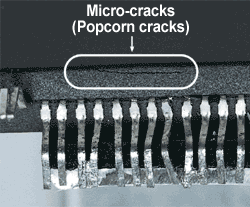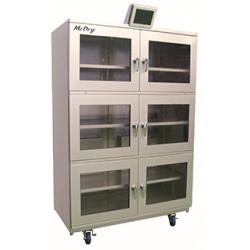Why do components require low humidity storage?
Low humidity storage of sensitive Surface Mount Devices as specified by IPC/JEDEC J-STD-033D“Standard for Handling, Packing, Shipping and Use of Moisture/Reflow Sensitive Surface Mount Devices.”
McDry Prevents Micro-Cracking of IC Packages During Reflow.

Micro-cracking occurs in nearly 100% of IC packages containing moisture during the Reflow process. This results in the corrosion of printed circuits for an extended period of time causing breakage of wiring and other problems. Micro-cracking can be prevented with storage and dehumidification of IC’s using McDry.
Some IC Packages are only guaranteed for 24 hours after they have been removed from moisture barrier bags (MBBS). Outside of the MBB, IC packages absorb moisture from the atmosphere which can result in micro-cracking during the Reflow process. To prevent micro-cracking, moisture containing IC’s can be baked or stored in McDry ultra-low humidity storage cabinets.
With respect to the above-mentioned floor life and dry box management, the management standard has been specified in IPC-JEDEC-J-STD-033D McDRY conforms to the standard.

What are the requirements for component storage?
Absorption and Dehumidification
Some IC Packages are only guaranteed for 24 hours after they have been removed from moisture barrier bags (MBBS). Outside of the MBB’s, IC packages absorb moisture from the atmosphere which can result in micro-cracking during the Reflow process. To prevent micro-cracking, moisture containing IC’s can be baked or stored in McDry ultra-low humidity storage cabinets.
What is the correct way to store components?
Low Humidity Storage Of Components
Option 1: Moisture Barrier Bags
Process: Moisture-sensitive components must be placed in a moisture barrier bag with a desiccant and RH indicator. The moisture barrier bag is then sealed.
Costs: Moisture barrier bag – Desiccant – RH indicator – Sealing Machine – Manual Labor
Option 2: Nitrogen Cabinet
Process: Moisture-sensitive components are placed in Nitrogen Cabinets for low humidity storage.
Costs: Cabinet – Nitrogen – Construction work to run N2 lines to the cabinet
Option 3: Mcdry Low Humidity Storage Cabinets
Process: Moisture-sensitive components are placed in Mcdry Cabinets for low humidity storage.
Costs: Cabinet – Electricity
Technical Benefit
McDry Cabinets are able to absorb moisture from components to help prevent defects such as micro-cracking.
Cost Benefits of McDry Cabinets
Compared to Option 1
Eliminates the need to purchase moisture barrier bags, desiccants and RH indicators.
Eliminates the need for manual labor.
Compared to Option 2
Eliminates the cost of nitrogen.
Eliminates the need for nitrogen lines.
McDry Cabinets can eliminate the need for baking of some components.
McDry Ultra-Low Humidity Storage Cabinets Product Overview
